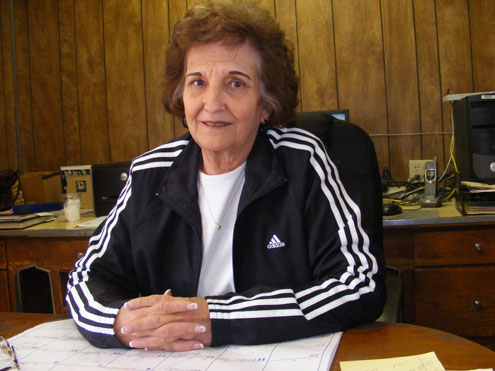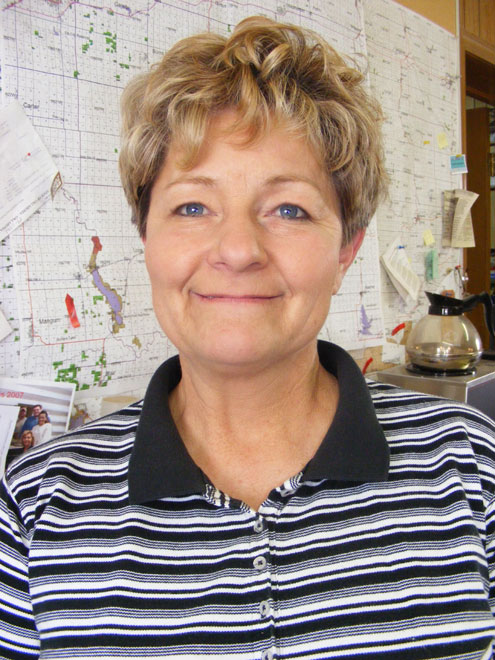SOUTHWEST OKLAHOMA -- The offices of Joann Rollins and Jeannie Hileman have been where the buck stops for 32 years.
Each of these women manage an Oklahoma farmers' cooperative cotton gin; one in Grandfield and one at Carnegie. They are the only two women who sit in what can be an agricultural hot seat; the rest of the gins in Oklahoma are managed by men.
Rollins has been employed at the Grandfield site for 25 years, five as a bookkeeper and 20 as the manager. Hileman worked as a bookkeeper and office manager for five years starting in 1990, then became the manager in 1995.

Joann Rollins, manager of the Farmers Cooperative Gin Co., Grandfield, Ok., sits at her desk taking care of gin business. photo from NTOK Cotton.
"I had been working in the office as a bookkeeper for five years," Rollins said. "I didn't expect to be offered the position when the manager retired. The board members asked me if I would take it and I said, 'Give me a week to consider it.' My kids urged me to accept and I did. I have not regretted my decision."
Hileman was offered the Carnegie position in an idle time when her manager decided to go to work for the new Cotton Bollweevil Eradication Program.
"I have really enjoyed my job," she said. "Our farmer members are top-notch people and I have a really good board of directors."
Rollins also compliments her customers and board members. " We have really loyal customers," she said. "I enjoy doing business with them."
In fact, both managers emphasized the teamwork that exists between them and the members of their respective cooperatives.
"We not only have a busness relationship, we are friends," Rollins said.
They explained the advantages of being part of a tightly-knit rural community where agricultural production is only a part of their everyday lives.
Both women were glad to sit for an interview and a picture, but both pointed out they would be leaving to attend the state high school basketball tournaments where their respective school teams would be completing.

Clients of the Farmers Cooperative Gin, Carnegie. Ok., are always welcomed by the pleasant smile and outgoing personality of Jeannie Hileman, who has been the gin manager since 1995. photo from NTOK Cotton
"We support our community and they support us," Hileman said.
Both of them have seen the good times and the lean times of farming in the southern plains. Rollins' gin processed 4,500 bales of cotton in the bumper 2007 season; at the end of the record drought in 2006, they ginned 450 bales.
Along with the vagaries of the weather, Hileman remembers the depradations of the bollweevil that brought the cotton industry to a standstill in the 1900s.
"In 1998, in the worst times of the bollweevil problems," she said, "we ginned 204 bales."
For comparison, in 1979, a season they use for comparing other bumper season to, the Carnegie gin processed over 10,000 bales. Last year, with the bollweevil removed as a production problem by the eradication program, Hileman oversaw the ginning of more than 11,000 bales.
Both Hileman and Rollins have proven their management skills over the years; some of them in different ways.
HIleman remembers the decison made by her board of directors to enter into a three year process of modernizing their gin.
"We changed about everything in it," she said. "It was a time when I found I could make decisions and say no to people when it was needed."
Perhaps a more silent, but very effective example of Rollin's personality is the aluminum ballbat that leans against the counter behind her desk.
When asked its significance, she smiles and says, "Well, last year we had a very serious discussion with an employee here in the office who was terminated. My board president gave me the bat the next day and it has stayed there ever since."
Ginning season in the fall of the year when the crop is brought in to be ginned is only a part of the cotton production activities the managers are involved in. For instance, farmers are now preparing their ground for planting later in the spring. Fertilizer and pesticide applications are only a few weeks away.
Rollins and Hileman are active each day helping their members make important decisions in these matters.
Agricultural economists project 2008 and 2009 cotton prices, along with prices for grains, will be very good, but very volatile. It is estimated cotton may be selling for .98 cents per pound this year and over $1 a pound in 2009, but along with the rewards of good prices, production costs elevate at the same time.
"This is another responsiblity we have," Hileman said. "Our members recently met to make decisions on how we can maximize our income and at the same time, do it as economically as possible."
Rollins seconds this explanation.
"We have to have as lean an operation as we can," she said. "We have to be able to cut our expenses to the bone without hurting our chances for making a top crop."
Both women have an active home life. Rollins has a son and a daughter and five grandchildren. Hileman has a son and a daughter.
They are typical of the modern American woman; successful professionals who balance their family lives and are involved in their respective communities.